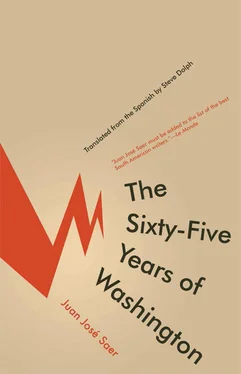Juan José Saer - The Sixty-Five Years of Washington
Здесь есть возможность читать онлайн «Juan José Saer - The Sixty-Five Years of Washington» весь текст электронной книги совершенно бесплатно (целиком полную версию без сокращений). В некоторых случаях можно слушать аудио, скачать через торрент в формате fb2 и присутствует краткое содержание. Год выпуска: 2010, Издательство: Open Letter, Жанр: Современная проза, на английском языке. Описание произведения, (предисловие) а так же отзывы посетителей доступны на портале библиотеки ЛибКат.
- Название:The Sixty-Five Years of Washington
- Автор:
- Издательство:Open Letter
- Жанр:
- Год:2010
- ISBN:нет данных
- Рейтинг книги:3 / 5. Голосов: 1
-
Избранное:Добавить в избранное
- Отзывы:
-
Ваша оценка:
- 60
- 1
- 2
- 3
- 4
- 5
The Sixty-Five Years of Washington: краткое содержание, описание и аннотация
Предлагаем к чтению аннотацию, описание, краткое содержание или предисловие (зависит от того, что написал сам автор книги «The Sixty-Five Years of Washington»). Если вы не нашли необходимую информацию о книге — напишите в комментариях, мы постараемся отыскать её.
The Sixty-Five Years of Washington — читать онлайн бесплатно полную книгу (весь текст) целиком
Ниже представлен текст книги, разбитый по страницам. Система сохранения места последней прочитанной страницы, позволяет с удобством читать онлайн бесплатно книгу «The Sixty-Five Years of Washington», без необходимости каждый раз заново искать на чём Вы остановились. Поставьте закладку, и сможете в любой момент перейти на страницу, на которой закончили чтение.
Интервал:
Закладка:
— You’re everywhere these days, he says. And then, to the Mathematician, alluding to the shouts a few moments before, No, I was asking if that tan came from the Costa Azul.
— Partly, responds the Mathematician modestly.
— And so? Tomatis asks. Where do the European girls grow it?
— Some in each armpit, says the Mathematician.
— No way!
— I swear, says the Mathematician. May you drop dead right here.
— Wow, Mathematician! Tomatis says with distracted admiration. Some strange thought crosses his mind and he is silent for a few seconds, looking bleakly at the ember on his cigarette, then turns toward Leto. How’s things?
— Things are good. I’m only so-so, Leto says.
Tomatis laughs.
— What subtle humor, he says. And to the Mathematician, Is there such subtle humor in Europe?
— There is, there is, the Mathematician answers, confirming his assertion with a solemn movement of his head.
— A sigh of relief, says Tomatis.
And so on, ultimately, more or less. Leto and the Mathematician have registered, as they say, his abrupt change in attitude, each in his own way and both convinced fundamentally of being the only one to notice, as opposed to Tomatis, who apparently does not seem to have caught on and continues to act in a way that reveals, under his witty euphoria, the depression and murky confusion pasted to the back of his easy laughter and clever turns of phrase. The contrast between the absent and anxious expression they came upon on the opposite sidewalk and his current lightheartedness, so sudden and mechanical, produces a certain discomfort in Leto and the Mathematician, as though there were something obscene and shameful in Tomatis’s sudden masquerade, while Tomatis, unaware of those impressions and persisting with his mundane rhetoric, raises his face, darkened by his beard, toward the Mathematician: No, jokes aside, how did it go in Europe? The Mathematician hesitates. A feeling of shame and irritation holds him back a few seconds in the face of Tomatis’s compulsive lightheartedness — he would prefer, it’s true, for Tomatis, having been surprised in the middle of an internal disturbance, to show less duplicity or more transparency, conforming his behavior to his real state of mind, but at the same time he tells himself — the Mathematician, no? — that maybe there’s some pride at work similar to what makes him hide, with meticulous precaution, the evidence of The Incident, and Leto who, without the Mathematician suspecting, is feeling the same things, reaches the same conclusion at practically the same moment: So much happiness to see us shows more mistrust than love . All of this of course without words or precise images and, of course, more or less.
After that hesitation which Tomatis, oblivious, does not perceive, and which Leto attributes, with some reason, to the Mathematician’s anticipated exhaustion, having already given many recitations, the Mathematician begins, monotonously, to list the cities: Avignon, a murderous heat; Barcelona, the quintessence of the Rosarian soul; Copenhagen, they seemed more proud of Andersen than of Kierkegaard; Naples, felt just like the Abasto Market; Brussels, for The Census at Bethlehem ; Fribourg, the Herr Professor must have been on leave; Rome, he imagined it differently; Nantes, a half-meteorological term. Because Tomatis does not seem to be listening, is occupied, severely, in taking the last drag from his cigarette then throwing it to the sidewalk, the Mathematician interrupts himself, but an irritated and somewhat surprised look from Tomatis impels him to continue: Rennes, the streets emptied at seven; Athens, Pergamino plus the Parthenon; Lisbon, you could almost see Entre Ríos from the Plaza of Commerce; Warsaw, there was nothing left; Oxford, a bunch of snobs. Brief, successive, polished and simplified by a fickle memory, the images the Mathematician’s words bring out, to the bright morning air, seem to ricochet against Tomatis’s disheveled and beard-darkened countenance — Tomatis, no? pale and unshaven, his hair a mess, his shirt wrinkled and his pants full of stains, who, between Leto and the Mathematician, not only because of his position on the sidewalk but also his height and even his age, has assumed, without looking anywhere in particular but with his head slightly raised toward the Mathematician, such a still posture that the quick and somewhat nervous shudder of his eyelids, to shield them from the sun, looks like an autonomous faculty, a little strange and disconnected from the rest of his body — Tomatis, I was saying, no? — seized, to put it one way, since he woke up, by a menace, the nameless, that will grip him all day, maybe all week, in a darkened zone; and while he listens to the Mathematician talk he thinks: if I’m going to. . and the whole universe is going to. . sooner or later is going. . is going. . while the Mathematician, without breaking his surveillance of Tomatis’s ragged expression or the persistent recitation of his thoughts on Europe, thinks: At least now he’s not pretending to listen . And Leto: From this version, longer and more ironic, you can tell he admires him more.
Ultimately, every thing, more or less, no? — and after all, what’s the difference. They visited, the Mathematician concludes, several important scientific centers. Scientific? Tomatis interrupts, bitterly shaking his head and fixing his stare on the Mathematician’s clear and now contented eyes, where Tomatis’s subtle rage, more genuine than his lighthearted chattiness, seems to produce considerable satisfaction. Scientific? Tomatis repeats, practically shouting. And then, in the same voice, Pushers on the police payroll more like it, pretending to understand what they call reality because they are so sure that what they’ve decided, without consulting anyone, are plants need to process something they’ve arbitrarily called photosynthesis in order to do that thing they call growing.
— In a certain sense, I don’t disagree, says the Mathematician, unfazed, not ignoring that, in some sense, his engineering studies and maybe his whole person are included in Tomatis’s description. And pulling from his pocket a paper folded in fourths, he adds, While we’re at it, would it be awkward for you to get the Association’s press release into the hands of your colleague correspondent? Thanks.
With the same conviction and goodwill he might demonstrate in receiving a rattlesnake, Tomatis grabs the folded sheet the Mathematician holds out. With pleasure , he says, looking away. If an engineer wrote this, the structure will need to be checked .
He starts laughing. Leto and the Mathematician laugh. This time, Tomatis’s laughter seems sincere, spontaneous, as though, overpowering the depression, not being a coarse engineer who lacks elegance of expression were enough, in the curious machinations taking place inside him, to force the menace, for some unknown reason, to withdraw temporarily. His entire self is clarified by the laughter — the laughter, no? — that sudden euphoria that comes to the face, accompanied by bodily shivers and internal flashes, abstract and present, it’s impossible to tell why some images and not others release that instantaneous and brilliant cascade that’s let loose for a few moments by the coincidence of things. Letting himself be carried along by the good mood, Tomatis pulls from his own pocket a sheet folded in fourths, almost identical to the one the Mathematician just gave him.
— This morning I wrote a press release too, he says, and, without further clarification, starts reading what is written on the page: In another man devoured / my own death I don’t see / but plagued by geometric flowers / I waste away the hours / and now they keep vigil for me . The Mathematician, who had half closed his eyes and assumed an expression of pleasure in anticipation of the reading, no doubt to demonstrate — and no doubt because of Leto’s presence — that he has already enjoyed the privilege of a private reading of Tomatis’s poems many times before, the Mathematician, when Tomatis finishes his slow and slightly pitched but altogether monotone reading, turns toward Leto, interrogating him with ecstatic eyes. And Tomatis, falling, as they say, silent, turns to look, with deliberate indifference, at the bright sidewalk, the blue sky, the cars, the people passing on the street. Brilliant , the Mathematician hastens to say. And then Leto, after hesitating, Could you read it again? I missed part of it .
Читать дальшеИнтервал:
Закладка:
Похожие книги на «The Sixty-Five Years of Washington»
Представляем Вашему вниманию похожие книги на «The Sixty-Five Years of Washington» списком для выбора. Мы отобрали схожую по названию и смыслу литературу в надежде предоставить читателям больше вариантов отыскать новые, интересные, ещё непрочитанные произведения.
Обсуждение, отзывы о книге «The Sixty-Five Years of Washington» и просто собственные мнения читателей. Оставьте ваши комментарии, напишите, что Вы думаете о произведении, его смысле или главных героях. Укажите что конкретно понравилось, а что нет, и почему Вы так считаете.












